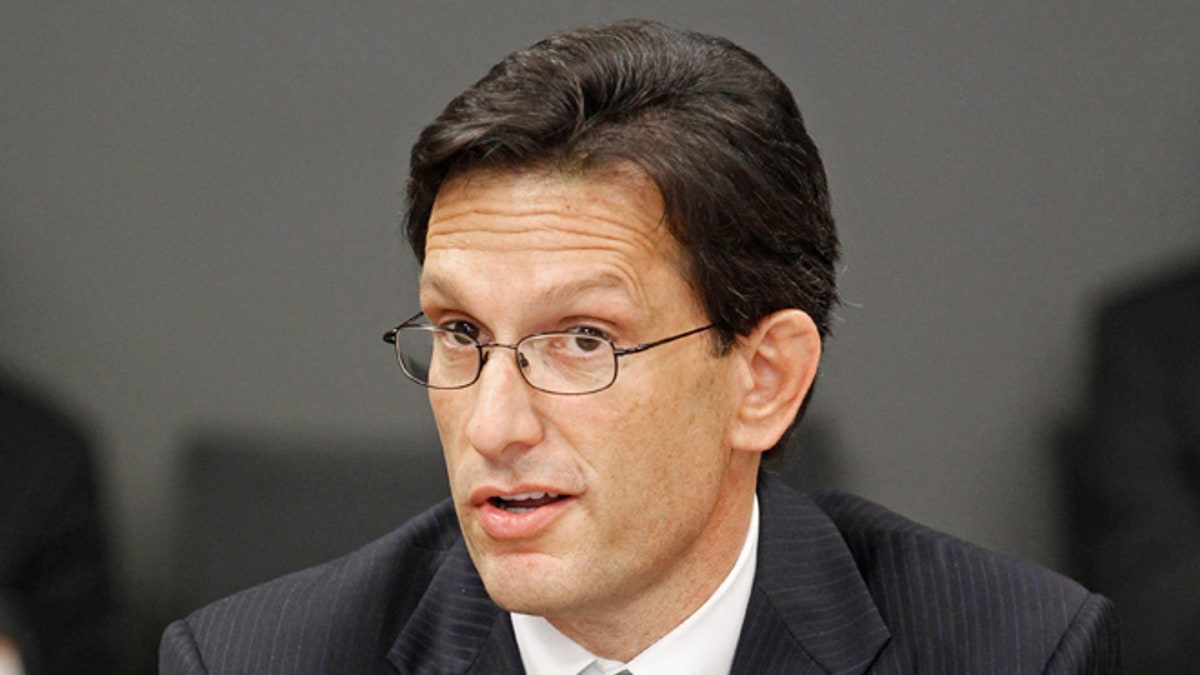
FILE: May 23, 2014: House Majority Leader Eric Cantor, R-Virginia, at the Siemens Energy Hub in Charlotte, N.C.
Now it’s House Majority Leader Eric Cantor’s turn to try and fend off a Tea Party-backed challenger.
The Virginia Republican congressman is facing an aggressive Republican primary opponent in Tuesday's election who has latched onto the increasingly hot-button issue of immigration to batter the incumbent GOP leader.
Dave Brat, an unheralded economics professor and novice politician, is accusing the seven-term Virginia congressman of supporting immigration legislation that would give “amnesty” to millions of people living illegally in the United States. And he has more recently argued that Cantor’s support for legal status for children who have illegally entered the country has fueled the problem of children from Central America pouring across the southern border, creating a humanitarian crisis.
"Once you announced that kids are welcome, they're going to head in," Brat told Breitbart News on Sunday.
Cantor, second in command of the GOP-led House behind Speaker John Boehner, has responded forcefully by boasting in mailers of blocking Senate plans "to give illegal aliens amnesty."
He also said he told President Obama in April that “House Republicans do not support Senate Democrats’ immigration bill and amnesty efforts, and it will not be considered in the House.”
The Virginia House race is one of numerous primary battles across five states on Tuesday -- in Maine, Nevada, North Dakota, South Carolina and Virginia.
South Carolina GOP Sen. Lindsey Graham also faces several primary challengers in his state, though he is leading the field by a significant margin.
Cantor, too, is in the lead in recent polls, though Brat appears to be closing the gap. A poll commissioned by The Daily Caller showed Cantor leading 52-40 percent. The poll of 583 primary voters was taken June 2, and had a margin of error of 4 percentage points.
On immigration, Cantor and other House Republican leaders are advocating a step-by-step approach that would in part begin with tighter border security, instead of the comprehensive bill backed by the Senate.
But they've made no move to bring legislation to a vote and appear increasingly unlikely to act this year.
Despite the attacks, Cantor appears well positioned for reelection.
The most recent campaign finance reports show he spent more than $1 million in April and May but still has more than $1.5 million in the bank.
With plenty of campaign cash and recent polls showing him with a double-digit lead, outside groups, including big business which supports immigration reform, have largely put their money into other races.
However, the American Chemistry Council, whose members include many blue chip companies, spent more than $300,000 on TV ads promoting Cantor. And the American College of Radiology political action committee paid nearly $23,000 for fliers touting Cantor as better qualified than Brat at "ending business-as-usual in Washington."
Brat, by contrast, has raised just more than $200,000 for his campaign, according to the most recent campaign finance reports. He's hoping to offset the cash disadvantage with endorsements from conservative activists, like radio host Laura Ingraham, and with help from Tea Party activists angry at Cantor.
Last month, a crowd of Brat supporters booed Cantor in front of his family at a local party convention.
"Listen, we are about a country of free speech, so decency is also a part of this," Cantor told the crowd.
He then took aim at Brat directly: "It is easy to sit in the rarified environs of academia in the ivory towers of a college campus with no accountability and no consequence ... when you throw stones at those of us who are working every day to make a difference."
Cantor's campaign has held to a variation of that theme in TV ads, a website and mailers accusing Brat of being a "liberal college professor."
Several longtime Republican incumbents have been fending off Tea Party primary challengers this year.
Mississippi Sen. Thad Cochran has been forced into a June 24 runoff with Tea Party-backed challenger Chris McDaniel, who is accusing the 76-year-old Cochran of being a Washington insider and not conservative enough.
However, a similar high-profile effort to unseat Senate Minority Leader Mitch McConnell failed last month in Kentucky.
Brat said Cantor, who was first elected in 2000 and has ties to Tea Party-backed lawmakers in Congress, has spent too much time in Washington and lost touch with the conservative base in his Richmond-area district.
"It's hard to represent people when you haven't met them," said Brat, who teaches at Randolph-Macon College, a small liberal arts school north of Richmond.
Cantor spokesman Ray Allen said Cantor isn't worried but has a duty to respond to Brat's attacks. He also suggested every candidate should run a full-scale campaign, considering super PACs can swoop into a race and spend millions.
The Associated Press contributed to this report.




